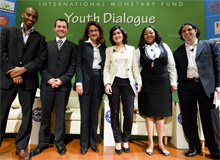
Typical street scene in Santa Ana, El Salvador. (Photo: iStock)
IMF Survey: Where Are the Jobs? Generation Y Asks
September 29, 2011
- Creating jobs a major global challenge
- Youth particularly badly affected
- Young leaders urge 'Give us a chance'
One of the biggest economic challenges facing the world is how to create more jobs, IMF Deputy Managing Director, Nemat Shafik, told a seminar on youth and unemployment held during the 2011 IMF–World Bank Annual Meetings.

Youth unemployment discussion speakers (from l) Gathitu, Pandurić, Shafik, Mezghanni, moderator Tsepiso Makwetla, Gensler (IMF photo)
YOUTH DIALOGUE
“In many parts of the world unemployment rates for young people are alarmingly high,” she said. “In almost every country youth unemployment is much higher than the average unemployment rate—take, for example, the Middle East where we recently had the so-called Arab Spring. We have unemployment rates for young people ranging from 20 to 40 percent in some countries.
“These are huge numbers of young people who are not having the opportunity to use the education and skills and talent and energy that they have to contribute to their societies.”
In a September 21 panel discussion during the Meetings, four young leaders from Croatia, Kenya, Tunisia, and the United States debated with Shafik the current challenges facing young people in their regions.
Energy in the audience
The discussion was open and candid. The energy and interest of the audience was evident, as displayed by the more than 150 participants from Washington, D.C., area universities, and Youth and Civil Society Fellows—sponsored by the IMF and the World Bank at the Meetings—as well as from online discussion with participants from around the world.
“I started watching this new-age [television] program on Superman, called Smallville, and I watched it until the second season,” said young Kenyan entrepreneur Kariuki Gathitu in his concluding remarks at the IMF Youth Dialogue. “It was frustrating for me because the dude was not flying! I knew the guy could fly and wanted to see him flying and eventually he got there. For me, this is the kind of situation young people face: young people in Africa and in Asia, they have powers they do not know they have.”
“We’ve been pooling our expertise to try and understand which macroeconomic policies are good for creating jobs,” Shafik said in her opening remarks, “and working very practically with them in some countries on things like helping governments, unions, and the private sector talk about job creation in several countries to figure out how to do that better”—highlighting the severity of this issue not only for the IMF but for the international community at large.
Included in the topics discussed were vocational training and education systems to provide the right work force for the labor market; bank lending to young entrepreneurs; and how to help the system to create jobs for the young generation.
Unneeded skills
After commenting that youth unemployment in his country is the second highest in Europe, Nikola Pandurić from Croatia emphasized that the “education system is providing young people with skills that are not needed in the labor market.” Pandurić called for a modification in “the education system to produce the work force that labor markets need.” He also said that in the post-recession era, recovery in Europe is mostly a “jobless recovery for the youth.”
Samar Mezghanni, an activist from Tunisia, recalled how the revolution in her country was initiated: “The young labor force in the Middle East is overqualified and yet the markets still offer low-skill jobs,” she said. “This is unacceptable. People cannot accept that and be satisfied. This is why we had the revolution … I do not think it’s just because some people who have university degrees do not find jobs, it’s because they do not find the right job.”
Brent Gensler, from the United States, offered a different perspective as a young entrepreneur with a business that operates in both the United States and China. “The workers here are not just competing against others in the U.S.,” he said.”They are competing against people all over the world because we are so connected now.”
Gensler added: “I think that a bigger problem is unemployed people who have dependants … We [the youth] only have ourselves to worry about. What I think is much more tragic is a single parent with two kids who has to provide for those kids as well.”
Direct relevance
Shafik reiterated the need to apply different solutions to different realities, and stressed the importance of the participation of the younger generation in the global debate on financial and economic challenges and solutions. “When you hear debates coming out of places like the IMF about the importance of the global economic recovery, and the importance that different countries do their part to make sure that growth recovers, remember that has to do with you.”
Listening to the voices and concerns of the young generation brings not only a refreshing view to the work of the IMF, but also enhances the internal discussion on policy measures. If the analogy of the modern Superman works for the younger generation, it should also work for the international community.
It may take more than two seasons to see the ‘dude’ fly, but he eventually does. As Gathitu pointed out, all that the youth is asking for is “Give us a chance.”


